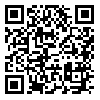Volume 51, Issue 1 (30 1993)
Tehran Univ Med J 1993, 51(1): 57-62 |
Back to browse issues page
Download citation:
BibTeX | RIS | EndNote | Medlars | ProCite | Reference Manager | RefWorks
Send citation to:



BibTeX | RIS | EndNote | Medlars | ProCite | Reference Manager | RefWorks
Send citation to:
Abhari S. A categorical view toward diagnosis and classification of war-related psychiatric disorders. Tehran Univ Med J 1993; 51 (1) :57-62
URL: http://tumj.tums.ac.ir/article-1-1750-en.html
URL: http://tumj.tums.ac.ir/article-1-1750-en.html
Abstract: (7762 Views)
Documented war experiences have provided early descriptions of different group of psychiatric features. A combat soldier with palpitation and chest pains was felt to have a functional cardiac disturbance, called soldier's heart. Anxiety and other symptoms indicating increased arousal were called shell shock and were thought to be related to lesions in the central nervous system (CNS). Describing analytically war events could operate with an enormous emotional intensity breaking through the ego defences and flooding it with an uncontrollable anxiety. Post traumatic stress disorder (PTSD) delineates a syndrome developing after a discrete traumatic event in a stress setting. Diagnostic conceptualization which tie PTSD to stress and trauma invariably involve two different approaches from two different theoretical bases: the concepts dealing with trauma on the one hand (which could effect on CNS) and those dealing with stress-response theory on the other. Author emphasizes on viewing the patients who complain of war psychiatric effects in three categories: (1) Non PTSD diagnoses that the patient ought to be treated accordingly (2) Traumatic neurosis which has overwhelming war stress related emotional aspects and is occurred in predisposed individuals. This category is suggested to be classified as post war stress disorder specifically, to be differentiated from other post traumatic psychiatric categories. (3) Author also suggests the third category as post traumatic war stress syndrome which is thought to have organic origin. Symptoms such as hyperacusis, hyperirritability, tinnitus and particular type of head aches which are mostly refractory to treatment confirm the hypothesis.
| Rights and permissions | |
 |
This work is licensed under a Creative Commons Attribution-NonCommercial 4.0 International License. |





